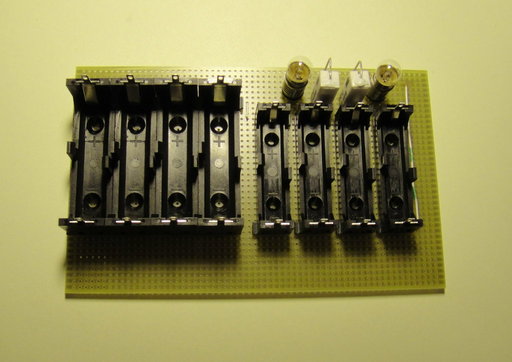« Reading List: Term Limits | Main | Reading List: Signature in the Cell »
Monday, November 9, 2009
Gizmos: Battery Discharger
 It's been a while since I've built a gizmo; here's the latest. Ever since I
got a 30 minute NiMH battery charger, I've noticed that certain batteries
are rejected by it as “not chargeable”, but that if I drain them, they'll
charge just fine and deliver the full capacity. I know that NiMHs are not
supposed to behave this way—that was one of the bad habits of NiCds, but
there you are. When I ran into this (which is frequently, because the
AA cells I use in the GPS I carry on my walks need to be recharged about
every four days), I'd run them down in a flashlight before recharging. But
that took about six hours and worse, flashlight bulbs (or at least the one I was
using) are designed for brightness, not long life, and after three or
four discharge cycles the bulb would burn out. Replacing the bulb was
almost as costly as throwaway batteries.
Hence, Fourmilab's Battery Discharger. What we have here are four AA and
four AAA battery holders, two 2.7 Ohm 5 W resistors, and two 1.5 V bulbs
(rated for in excess of 3000 hours life), all wired in parallel. You
just put in the batteries and let it go until the lights go out and then
you're ready to recharge (NiMHs have a voltage curve which is very flat
until it falls off the cliff at the end). Since the batteries are in parallel,
you can't get the dreaded “polarity reversal” which occurs with series connections
such as a 3 V flashlight. Why two bulbs? It increases the current draw and, more
importantly, lets you distinguish a burned out bulb from the discharge
condition.
It's built on a prototype board which has linear traces running the long direction, so with the exception of two jumper wires, all of the parallel
connections are made by the traces on the board.
I just used it on some troublemaker batteries and it took about half an hour to
discharge them, after which they recharged just fine. The power resistors barely
rise above room temperature when it's running; they needn't be anything like
5 W but that's what I had in the junk box.
There are stick-on elastomeric feet on the bottom.
It's been a while since I've built a gizmo; here's the latest. Ever since I
got a 30 minute NiMH battery charger, I've noticed that certain batteries
are rejected by it as “not chargeable”, but that if I drain them, they'll
charge just fine and deliver the full capacity. I know that NiMHs are not
supposed to behave this way—that was one of the bad habits of NiCds, but
there you are. When I ran into this (which is frequently, because the
AA cells I use in the GPS I carry on my walks need to be recharged about
every four days), I'd run them down in a flashlight before recharging. But
that took about six hours and worse, flashlight bulbs (or at least the one I was
using) are designed for brightness, not long life, and after three or
four discharge cycles the bulb would burn out. Replacing the bulb was
almost as costly as throwaway batteries.
Hence, Fourmilab's Battery Discharger. What we have here are four AA and
four AAA battery holders, two 2.7 Ohm 5 W resistors, and two 1.5 V bulbs
(rated for in excess of 3000 hours life), all wired in parallel. You
just put in the batteries and let it go until the lights go out and then
you're ready to recharge (NiMHs have a voltage curve which is very flat
until it falls off the cliff at the end). Since the batteries are in parallel,
you can't get the dreaded “polarity reversal” which occurs with series connections
such as a 3 V flashlight. Why two bulbs? It increases the current draw and, more
importantly, lets you distinguish a burned out bulb from the discharge
condition.
It's built on a prototype board which has linear traces running the long direction, so with the exception of two jumper wires, all of the parallel
connections are made by the traces on the board.
I just used it on some troublemaker batteries and it took about half an hour to
discharge them, after which they recharged just fine. The power resistors barely
rise above room temperature when it's running; they needn't be anything like
5 W but that's what I had in the junk box.
There are stick-on elastomeric feet on the bottom.
Posted at November 9, 2009 20:18